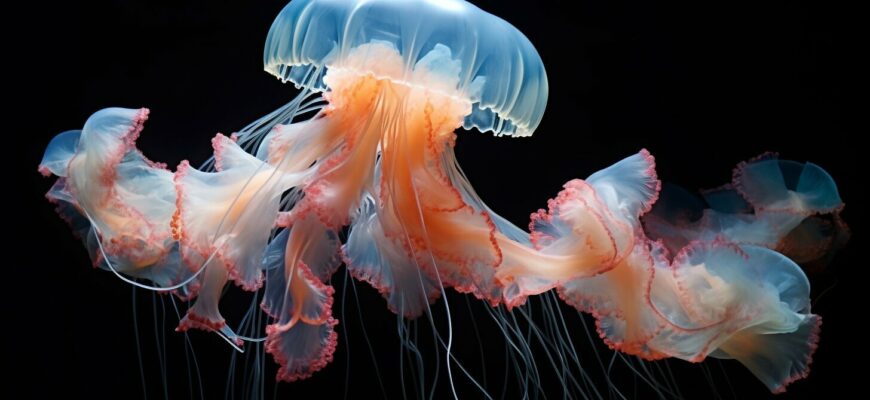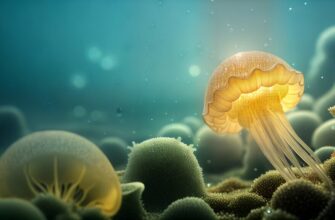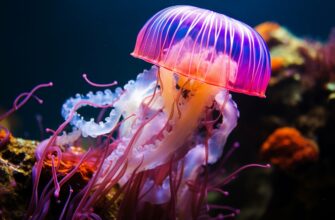Jellyfish, with their gelatinous appearance and long tentacles, are intriguing sea creatures that have captivated both scientists and beachgoers alike. While we commonly associate them with water, have you ever wondered whether jellyfish can survive outside of it?
Contrary to popular belief, jellyfish do have a certain level of tolerance for surviving out of water. However, their ability to do so is limited and depends on various adaptations that they have developed over time to cope with changing environmental conditions.
- The Adaptations of Jellyfish for Survival Out of Water
- The Role of Jellyfish Tentacles in Survival Out of Water
- Jellyfish Adaptations for Different Environments
- The Challenges of Surviving Out of Water for Jellyfish
- Research and Studies on Jellyfish Survival Out of Water
- The Frequently Asked Questions about Jellyfish Survival Out of Water
- What happens to a jellyfish when it is out of water?
- Is it safe to touch a jellyfish that has washed up on shore?
- Can jellyfish survive in captivity?
- Are all types of jellyfish capable of surviving out of water?
The Adaptations of Jellyfish for Survival Out of Water
Jellyfish are primarily aquatic creatures, but they have evolved certain adaptations that allow them to survive out of water for short periods of time. These adaptations enable them to tolerate challenging environmental conditions, such as low oxygen levels and dehydration.
One of the most unique adaptations of jellyfish is their ability to enter a dormant state known as a “polyp stage”. During this stage, they can withstand prolonged periods of dehydration and low oxygen levels. The polyp stage allows jellyfish to conserve energy, making them more resilient and better able to survive in challenging environments when other aquatic creatures would perish.
In addition to their polyp stage, jellyfish have also developed mechanisms for regulating their internal salt and water balance. This helps them to maintain their cellular functions while out of water and prevents them from becoming dehydrated. Jellyfish also have a mucus layer that helps to protect their delicate bodies from exposure to the air, reducing the risk of injuries and infections.
The Role of Jellyfish Tentacles in Survival Out of Water
Jellyfish tentacles are essential to their survival outside of water. The tentacles contain specialized cells known as nematocysts, which are capable of injecting toxins into predators that come into contact with them. This defense mechanism provides some protection against predators that may attempt to prey on jellyfish while they are out of water.
The tentacles also play a critical role in helping jellyfish to sense their environment and locate sources of food and water. They are highly sensitive to changes in temperature, salinity, and water flow, which help jellyfish to navigate and survive in dynamic environments.
Jellyfish Adaptations for Different Environments
Some species of jellyfish have developed adaptations that allow them to survive in different environments, such as freshwater or brackish water. For example, the freshwater jellyfish Craspedacusta sowerbyi has a unique set of adaptations that enable it to survive in freshwater environments with low salt concentrations. It has a more complex polyp stage that allows it to reproduce asexually and form colonies, helping it to adapt to changing environmental conditions.
| Jellyfish Adaptations for Survival Out of Water | How They Help Jellyfish Survive |
|---|---|
| Polyp stage | Allows jellyfish to withstand prolonged periods of dehydration and low oxygen levels, conserving energy and making them more resilient |
| Salt and water regulation | Helps jellyfish maintain internal balance while out of water, preventing dehydration and maintaining cellular functions |
| Mucus layer | Protects jellyfish from exposure to the air, reducing the risk of injuries and infections |
| Tentacles | Contain nematocysts for defense against predators, and help jellyfish sense their environment and locate sources of food and water |
The Challenges of Surviving Out of Water for Jellyfish
While jellyfish have developed unique adaptations to survive out of water, they still face various challenges that limit their abilities to do so.
Perhaps the biggest challenge for jellyfish out of water is dehydration. Jellyfish primarily survive in water, and their bodies are mostly made up of water. When they are out of water, they lose moisture quickly, leading to dehydration. This can cause their bodies to shrink and lose shape, which can affect their ability to swim and move.
Another challenge for jellyfish outside of their natural habitat is exposure to predators. When jellyfish are in the water, they have some protection from predators, such as fish and turtles. However, when out of the water, they are more vulnerable to attacks. This can lead to physical damage, making it even more difficult for the jellyfish to survive.
Additionally, the survival abilities of jellyfish out of water are limited. While they can enter a dormant state to conserve energy and survive in harsh conditions, they still require water to survive. They cannot survive outside of water for extended periods.
Research and Studies on Jellyfish Survival Out of Water
Scientific research has shed light on the fascinating ability of jellyfish to survive out of water for extended periods. A study published in the journal PLOS ONE in 2018 revealed that certain species of jellyfish can enter a state of suspended animation, known as quiescence, when exposed to air. During this time, their metabolism slows down, and they become immobile, conserving energy until they are back in the water.
| Year | Study | Findings |
|---|---|---|
| 2018 | PLOS ONE | Some jellyfish can enter a state of suspended animation, known as quiescence, when exposed to air. |
| 2015 | Marine Biology | Certain species of jellyfish can tolerate a wide range of salinity levels, enabling them to survive in different water conditions. |
| 2011 | PLoS Biology | Jellyfish have unique genes that enable them to adapt to different environmental conditions, including variations in temperature and salinity. |
Another study published in the journal Marine Biology in 2015 found that certain species of jellyfish can tolerate a wide range of salinity levels, enabling them to survive in different water conditions. This adaptation may explain why some jellyfish can survive in areas with varying levels of saltwater and freshwater.
Further research published in the journal PLoS Biology in 2011 revealed that jellyfish have unique genes that enable them to adapt to different environmental conditions, including variations in temperature and salinity. These findings suggest that jellyfish may have evolved specialized abilities to survive in a variety of environments.
The Frequently Asked Questions about Jellyfish Survival Out of Water
Can jellyfish survive out of water for an extended period of time?
While jellyfish can survive out of water for a short period of time, their ability to sustain themselves for longer periods is limited. They can enter a dormant state called diapause when exposed to unfavorable environmental conditions, which allows them to conserve energy and increase their chances of survival.
What happens to a jellyfish when it is out of water?
Without the buoyancy provided by water, jellyfish can become dehydrated and unable to move. They may also be exposed to predators and other threats, which can significantly reduce their chances of survival.
Is it safe to touch a jellyfish that has washed up on shore?
No, it is not safe to touch a jellyfish that has washed up on shore. Even if it appears to be dead, its tentacles may still contain venom that can cause injury or irritation.
Can jellyfish survive in captivity?
Yes, jellyfish can survive in captivity as long as they are provided with adequate conditions, such as the right water temperature, salinity, and food source. However, keeping jellyfish as pets is not recommended as it requires specialized care and expertise.
Are all types of jellyfish capable of surviving out of water?
No, not all types of jellyfish are capable of surviving out of water. Some species are more adaptable to changes in their environment than others, which may affect their ability to survive outside of water.
Hopefully, this FAQ has provided you with a better understanding of jellyfish survival out of water. Remember to always exercise caution and avoid touching jellyfish, whether they are in the water or on land.









